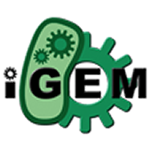
The University of Washington iGEM team brings students together from multiple disciplines to work together to design, build, test, and measure a system of their own design using interchangeable biological parts and standard molecular biology techniques. The team consisted of 37 undergraduates from multiple disciplines including Biochemistry, Bioengineering, Computer Science, Electrical Engineering, Informatics, Biology, Physics, ACMS, and Chemical Engineering. Seven Biochemistry students that are on the team include Angela Wong, Hannah Redden, Karl Anderson, Renaldo Sutanto, Angie Dang, Kateka Seth, and Kristine Leano.
The UW iGEM team worked on Chemically induced dimerization of Nanobodies for the Development of Versatile Biosensors.
Chemically induced dimerization (CID), in which two proteins dimerize only in the presence of a small molecule, has been widely used to control cell signaling, regulatory, and metabolic pathways, and used as logic gates for biological computation in living mammalian cells. However, few naturally occuring CID systems and their derivatives are currently available. Creating a CID system with desired affinity and specificity for any given small molecule remains an unsolved problem for computational design and other protein engineering approaches. To address this challenge, the team has used a novel strategy to select CID binders from a vastly diverse combinatorial nanobody library. They created new CID systems that can sense cholecalciferol and artemisinin. They are also validating CID biosensors by a yeast three-hybrid system and building structural models to understand the small molecule-induced dimerization.